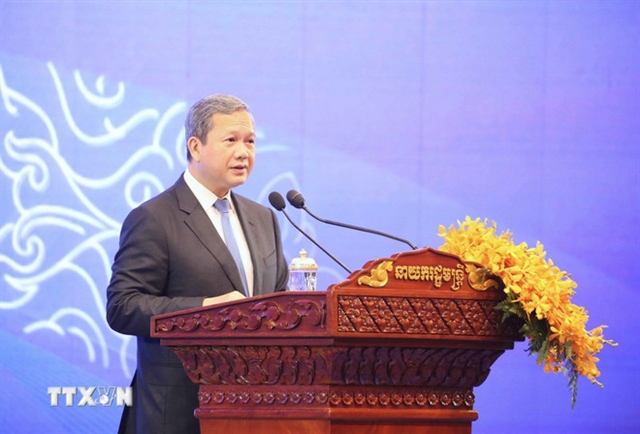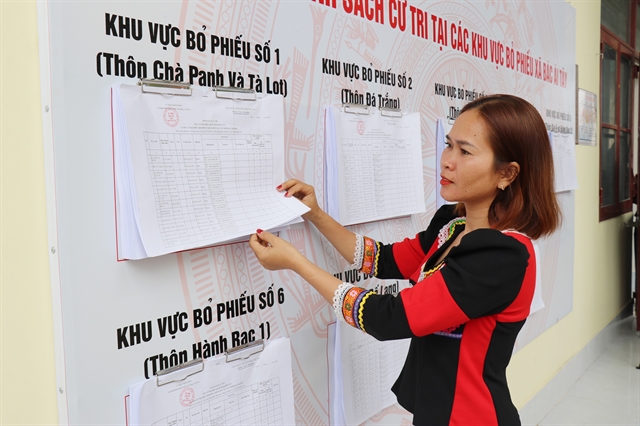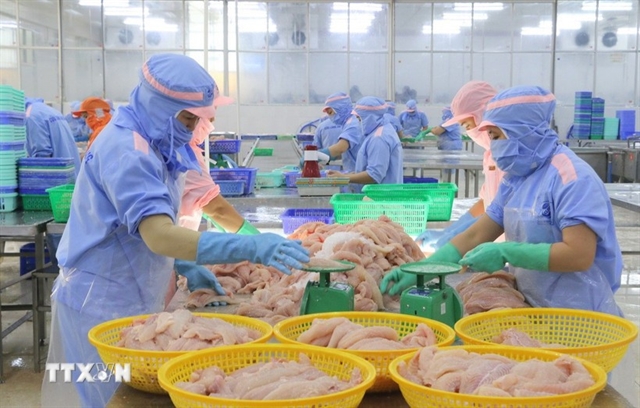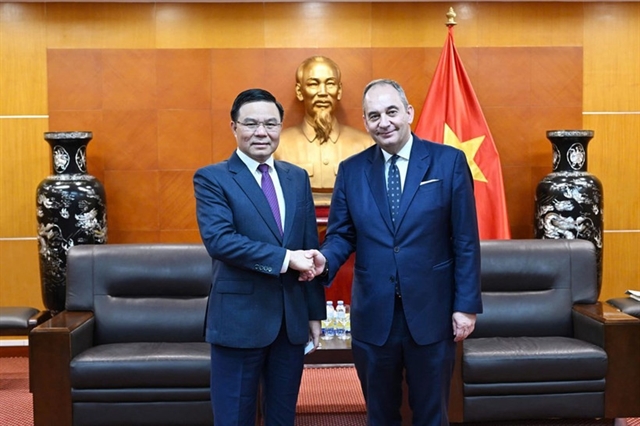 Economy
Economy

The trade co-operation programme between HCM City and southern provinces has over the past years helped significantly promote consumption of his province’s products, enabling businesses to expand production and trading.

|
| Products from other localities are showcasing on the sidelines of a conference held recently in HCM City to review the trade cooperation programme between the city and other cities and provinces in the south over the past five years . — VNS Photo Xuân Hương |
HCM CITY — The trade co-operation programme between HCM City and southern provinces has over the past years helped significantly promote consumption of his province’s products, enabling businesses to expand production and trading and contributing to socio-economic development, a Bến Tre Province leader has said.
Nguyễn Hữu Lập, vice chairman of its People’s Committee, said, “The programme has helped manufacturers in the province find regular outlets for their products, making them feel secure about investing more into expansion and improving product quality.”
Châu Thị Lệ, deputy director of the Long An Province Department of Industry and Trade, said HCM City, a large market for her province’s products, played an important role in guiding provinces’ agriculture by fixing standards their produce have to meet to sell to it.
“The province actively encouraged farmers to change their methods towards safe production in accordance with VietGAP standards, but achieved very limited results.
“When HCM City set the purchase standards … farmers immediately changed their production methods to enable their produce to meet these requirements.
“Thanks to HCM City’s requirements, Long An has built 17 safe agricultural supply chains for vegetables, rice, chicken, pork, beef, and seafood and is building three more for dragon fruit, vegetables, mushrooms.
“Besides, many safe and organic production models are being adopted.”
Bùi Tá Hoàng Vũ, director of the HCM City Department of Industry and Trade, said, “Enhancing demand-supply links is an indispensable and important aspect of trade.
“The Trade Cooperation Programme between HCM City and other provinces and cities has had a positive effect, creating comprehensive co-operation in the field of trade between the city and provinces and cities in the south-eastern and south-western regions.
“During the last five years 3,193 contracts and MoUs have been signed between city businesses and those in the southern region worth an estimated VNĐ4.5 trillion (US$194.06 million) a year on average.”
Provinces and cities have created favourable conditions for HCM City businesses to set up shop there and to collaborate with farmers for animal breeding and cultivation, according to his department.
Twenty eight firms participating in the city’s price stabilisation programme have invested more than VNĐ18 trillion ($778.1 million) in 47 production facilities and 63 agricultural farms in their localities.
Thus they have created reliable raw material sources and ensured quality, the department said.
Saigon Coop, for instance, has developed a system of warehouses, logistics and supermarkets throughout the country and is a large buyer of agricultural products.
Vissan is associated with many livestock breeding farms in provinces and cities. Saigon Livestock Breeding and Food Processing Company (Sagrifood) annually supplies 80,000 piglets to breeding farms in 23 provinces and cities nation-wide, of which 80 per cent are in the south.
Nguyễn Huỳnh Trang, deputy director of the city Department of Industry and Trade, said most enterprises participating in the city’s price stabilisation programme distributed at a single price nation-wide.
Thus, they contributed to stabilising markets around the country, she pointed out.
"In addition, the city’s three wholesale markets receive an average of 8,000 tonnes of agricultural products and foodstuffs every day from other localities for consumption in the city and transshipment to many other provinces and cities, helping balance supply and demand in the southern region.”
Following the resounding success of the programme, the HCM City Department of Industry and Trade will continue to work with its counterparts in other cities and provinces for another five years.
They plan to enhance exchange of information, sharing their experiences in management of industry and trade, production, and trading and discussing the strengths of each province and city.
In the next phase, the programme is expected to not only expand domestic consumption, but also promote export of industrial consumer products and household appliances and build brands for agricultural products and specialities of each locality.
Government agencies will work to improve the efficiency of the programme to enable more businesses to meet, exchange information and explore co-operation opportunities.
Lập said the Ministry of Industry and Trade, HCM City and businesses should continue to provide businesses in his province with information about the market and requirements for goods, help connect them with distributors and create favourable conditions for their goods to enter the city’s modern distribution network.
Dương Anh Đức, vice chairman of the HCM City People’s Committee, said, “The city will continue to direct relevant departments and agencies to clear obstacles to furthering trade between the city and other cities and provinces.”— VNS




